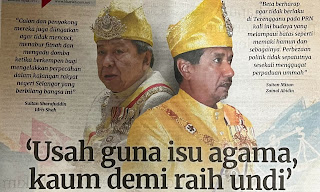Is Tunku Abdul Rahman’s dream dead? The nation’s founding father had once said, “We are all Malaysians. This is the bond that unites us. Let us always remember that unity is our fundamental strength as a people and as a nation”.
Fast forward to 2023, and the main question is, how united are Malaysians and are the same sentiments shared by those from Sabah and Sarawak? Conservative politicians and nationalists have demanded a “Malaya for the Malays”. They label 9th generation non-Malays as “pendatang” (immigrants). What happened to Tunku’s rallying cry? Have some Malay leaders forgotten their history? Is this how they insult Tunku’s memory and legacy?
Meanwhile, there is increasing frustration and rising discontent among both Sabahans and Sarawakians over several issues such as freedom of religion, allocation of funds for infrastructure, and the provisions for education and medical care. Some people from the peninsula still refer to Sabah and Sarawak as states, when in truth they are regions. When Malaysia was formed, it was understood that they were equal partners.
Both Sabah and Sarawak are rich in natural resources such as timber, minerals, jungle products, natural gas and hydrocarbon deposits. Despite being major oil and gas producers, the authorities consider Sabah as the poorest “state” in Malaysia, and Sarawak the third poorest. (Kelantan is the second poorest state).
The huge contribution of oil income from East Malaysia most probably financed the highways in the peninsula and the irony is that the Pan-Borneo highway is still struggling to be completed. Many Malaysians are aware of the significance of Aug 31, but a few are still ignorant about Sept 16 being another important milestone in Malaysian history. So, which day carries more weight for Malaysians?
Another of Tunku’s important quotes was, “All talk on Islamic states is just an empty dream. No man in his right sense would accept a nation which bases its political administration on religion, and in a country like Malaysia, with its multiracial and multi-religious people, there is no room for an Islamic state”.
Education is a great leveller of people and schools should be places that foster integration, but by 2023, they appear to have moved away from promoting unity. Instead, religion appears to be a major focus and the amount of time spent on religious subjects is worrying some parents, even Muslims. With the introduction of the Imam Al-Nawawi 40 Hadith, meant only for Muslim pupils, segregation will be more pronounced.
The “them” and “us” cultures will predominate and exacerbate the “Muslims versus non-Muslim” divide. Did Education Minister Fadhlina Sidek ask Muslim parents if they agreed to their children studying the modules? Of all the critical reforms that the minister knows are needed to improve our children’s learning experience, Fadhlina had to choose this route.
So in the end, Malay students get to fine-tune their religious knowledge of the hadith, whilst non-Malays will focus on Science, Technology, Engineering and Mathematics (STEM) subjects and prepare themselves for the challenges of artificial intelligence, sustainability and the digital economy of the modern world. The afterlife can wait.
Tunku worked his magic twice. The first in 1957 and again in 1963, when he brought together diverse communities to become one nation. In 1957, Malaya gained its independence from the British in a peaceful transition from colonial rule to being governed by a cabinet whose members reflected the multiracial composition of the newly independent Malaya.
Undi 18 - inilah masalahnya, blurrr!!!...
Come 1963, we saw the formation of Malaysia under the Malaysia Agreement 1963 (MA63) but until today, the terms have not been fully respected or upheld. It seems natural for many East Malaysians to call for secession from Malaysia, but who would independence benefit the most? Perhaps, it is easier to ask, who would independence harm the most?
Little has changed. Then, as it is now, Sarawak is still an important ally for whichever coalition that rules in Putrajaya. Alarmingly, the federal government still treats Sabah and Sarawak like its stepchildren, with the common issues of race, religion and rural communities being used to divide Malaysians.
In years gone by, secession would have harmed Umno Baru and BN as they would lose power, without the Sarawak “fixed deposit”. The same holds true today with the unity government. Successive prime ministers have done little to preserve Tunku’s legacy. Racism and religious extremism have increased, and those who lived in the 1960s, 1970s and possibly the 1980s, claim that we were more united in the past.
Today, Malay children view non-Malays with suspicion and think that anyone who speaks English is not patriotic. Patriotism is measured by the presence of a flag or flags, flying outside your business premises or home.
Successive prime ministers bent over backwards to please the Malays but ignored other races. How can we claim to be Merdeka when most of us are still fearful of speaking up to determine our future?
We need to appreciate that Malaysia is a product of all its people and is not a success just because of one race. Don’t allow Malaysia to be Merdeka in name only, and we will achieve true independence, once we liberate our minds. - Mariam Mokhtar
Bulang 8 gak,Din & lebai kena game
dgn "jumlooohhh dohh cukoopppp..."
cheers.
Sumber asal: After 66 years, how united are we?...














{ 0 comments... read them below or add one }
Post a Comment